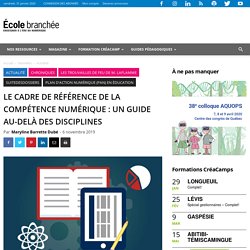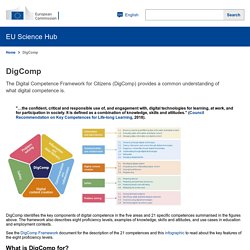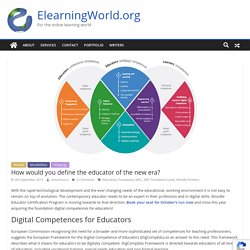

Framework1 digital usa. 4 Things to Consider When Teaching Digital Literacy to College Students. Consuming information online is as simple as a click, scroll, or swipe these days. All searches are not created equal — and rarely do we think about fact checking what we find on the internet. “…The internet is actually changing the way we read, the way we reason, and even the way we think, and all for the worse,” says Tom Nichols in his recently published book, The Death of Expertise. In higher education, I think it is imperative that we teach our learners and peers about what it means to participate and interact in digital spaces and places.
How can our institutions help students, staff, and faculty “be” online and consider how both information and digital environments impact knowledge sharing and learning. 1. Digital literacy is multifaceted. NMC defines digital literacy as “not just understanding how a tool works but also why it is useful in the real world and when to use it.” Beyond digital competencies, we need to develop media and information fluency in higher education. 2. 3. 4. Le Cadre de référence de la compétence numérique : un guide au-delà des disciplines. En plus de présenter des ressources pour les enseignants d’univers social, le Dr Thierry Karsenti a résumé les 12 dimensions du Cadre de référence de la compétence numérique à l’occasion du dernier congrès de la Société des professeurs d’histoire du Québec (SPHQ).

La Société des professeurs d’histoire du Québec (SPHQ) tenait son congrès annuel les 17 et 18 octobre derniers à Sherbrooke. Dans son atelier sur le Cadre de référence de la compétence numérique, le Dr Karsenti, titulaire de la chaire de recherche du Canada sur les TIC en éducation, a, d’entrée de jeu, rappelé que les dimensions du Cadre et leurs éléments respectifs ne sont pas associés à une discipline particulière, chacun s’appliquant à une multitude de contextes. De ces 12 dimensions, citons notamment : Utiliser le numérique pour apprendre;Développer et mobiliser sa culture informationnelle;Collaborer à l’aide du numérique;Produire du contenu à l’aide du numérique. L’École branchée publie les guides pédagogiques SCOOP! EU Science Hub. Being digitally competent – a task for the 21st-century citizen DigComp 2.2 – Call for Contributions: The JRC is glad to announce that the DigComp 2.2 revision starts in January 2021 and it will be finalised in a new publication in early 2022.

All the communication and collaboration will take place through the DigComp Community of Practice (CoP). The CoP is free of charge for anyone to join, just follow the instructions on the main page. For more details see the PDF message Call for Contributions. The European Digital Competence Framework, also known as DigComp, offers a tool to improve citizen's digital competence. The report called DigComp 2.0 presents the updated list of 21 competences (also called the conceptual reference model) whereas the eight proficiency levels and examples of use can be found in DigComp 2.1.
What can DigComp do for citizens? BIBLIOGRAPHIE. 000235 UNAM MagReseau91V3 WEB.
Moodle. With the rapid technological development and the ever changing needs of the educational, working environment it is not easy to remain on top of evolution.

The contemporary educator needs to be an expert in their profession and in digital skills. Moodle Educator Certification Program is moving towards to that direction. Book your seat for October’s run now and close this year acquiring the foundation digital competences for educators! Digital Competences for Educators European Commission recognising the need for a broader and more sophisticated set of competences for teaching professioners, suggests the European Framework for the Digital Competence of Educators (DigCompEdu) as an answer to this need. It constitutes of 22 competences organised in six Areas as shown in the picture below. RMTL and MEC On the basis of the RMTL, the DigComEdu competences, and the methodology from the UNESCO curriculum development, Moodle offers the MEC: Moodle Educator Certification Program. Anna Krassa.
Developing digital skills in the modern workplace. <p>Unable to play video. Please enable JavaScript or consider upgrading your browser. </p> Captions Settings Dialog Beginning of dialog window. Escape will cancel and close the window. 0:10Skip to 0 minutes and 10 secondsWe're in the digital age now and so are your learners and trainees. 0:54Skip to 0 minutes and 54 secondsMany jobs involve working with digital data, how can you help your learners manage digital information? Articles et guides. Sites et ressources en ligne. Outils en ligne. Référentiels.